We publish a text written by comrades from the campaign InEUmanity (also included in our new broschure):
On the 17th of April of 2019, the European Parliament adopted a new Regulation[1] radically reshaping the tasks, powers and organizational structures of the European Border and Coast Guard Agency (Frontex). The increased deportation of fugitives, the primary objective of which is laid down in the first article, is Europe’s only and brutal response to the still unresolved “migration issue”.
The initial situation is that from spring 2015 onwards more and more migrants came to Europe to seek protection, better living conditions or future prospects. However, the borders of the Balkan route open by the Schengen Code were practically closed in March 2016 in order to prevent arrivals from reaching the often desired Western European countries. The Non-Refoulment commandment[2] not to reject those in need of protection at their own borders is systematically violated in order to take account of the xenophobic shift to the right in the member states. Since then, there has been no forwards, no stays and no backsliding. For the fugitives this is a hopeless and indeed hopeless situation.
A solution in the form of a new European regulation of the Common European Asylum System (CEAS) has been lying idle for a long time because the member states could not reach agreement. So the new regulation is supposed to resolve the “congestion” immediately and in the future.
The core element of Frontex’s new field of activity is to support third countries in deciding on the need for protection of refugees and to organize repatriations in the event of their refusal. In addition, there will be an increase in the staffing and financial resources of the Border Management Agency, as it will be given a more comprehensive remit to implement the measures. In concrete terms, this means an increase in staff to 10,000 (wo)men by 2027 and an increase in the budget for the period 2021-2027 to a total of 34.9 billion euros. Frontex is made up of agency staff (EU officials) and teams seconded from the Member States.
Until now, Frontex has only been active in member states of the Schengen area if a constitutional decision by this state on entry or stay in the country was available. Frontex can now also become active in third countries on its own initiative. Frontex is responsible for the preparation, provision of relevant information and advice on repatriation decisions and their implementation. The repatriation decision is therefore formally taken by the third country, which alone serves to circumvent the European protection of fundamental rights.
Frontex employees have a general authorization to carry out all border controls and measures relating to rejection, which are actually reserved for the respective states, which is an obvious breach of the Schengen Code. Access to an asylum procedure can therefore simply be thwarted. This is also to be expected, as the Member State Teams have no special training to be able to recognize the need for protection of people and the entire restructuring is aimed at preventing the entry of “illegal migrants”.
There is also talk of setting up “early warning systems”. On the basis of EUROSUR data sets and “risk analyses”, it is to be indicated when large crowds of people set off to cross the border illegally. The teams then have the task of preventing this. The rhetoric of the law thus leaves no doubt about the misanthropy of the whole project.
So-called controlled centres are to be set up to carry out these operations. The text of the law does not say whether they will be open or closed and whether they can also be set up in third countries. It is very likely that the centres in which asylum procedures are to be carried out within eight weeks will be as bad as the Greek and Italian hotspot camps in terms of congestion, miserable living conditions, systematic violations of the law and exclusion from social participation.
A liability gap also means that there is no legal protection for those affected. In third countries, civil servants are subject to directives issued by third countries which are not bound by the EU Charter of Fundamental Rights. Although all states in Europe belong to the ECHR, it does not contain any right to asylum, so that no action can be brought before the ECHR regarding repatriation. An action before the European Court of Justice to review the legality of Frontex’s actions is impossible for the persons concerned, since the decision was formally taken by a non-EU state and the repatriation took place on its instructions.
In addition, the Regulation provides for the use of force (pepper spray, blows, as a last resort, the use of firearms) as a legitimate means of enforcing the tasks. However, if someone exceeds the limits of the proportionate use of force, criminal proceedings are also excluded: Frontex officials enjoy immunity in the third country, no complaint can be filed in the sending country and there is no European criminal procedure.
Even extrajudicial institutions do not promise any protection: A Commissioner for Fundamental Rights and a complaint mechanism for the prevention and clarification of human rights violations are largely ineffective, as this means a purely internal and thus not independent examination of incidents. When the regulation was adopted, MEPs focused above all on the Balkan countries in order to open up internal European borders. There is no regional restriction, however, so that nothing would stand in the way of application in Libya or Turkey in the future[3].
The regulation is argued on the basis of the absurd assumption that EU officials working in other countries are exporting their own standard of protection of fundamental rights. Their real aim, however, is to deport people from non-EU countries before they enter EU territory.
This was exemplified by the debate in the European Parliament, in which there was hardly any mention of the human rights of refugees. On the other hand, the importance of the internal openness of the EU was repeatedly stressed. Fugitives are thus (re)brought into unworthy life situations so that EU citizens can travel freely.
The Regulation is therefore a new expression of a racist and Eurocentric worldview. Even though the law repeatedly describes compliance with EU law, international law and human rights, its practical application, on the other hand, is an immanent violation of human rights. The adoption of this law makes visible the new quality of the shift to the right in the EU.
[1]http://www.europarl.europa.eu/doceo/document/TA-8-2019-0415_DE.pdf
[2]“The Non-Refoulement Principle prohibits the extradition, expulsion or return of a person to another country if there are serious reasons for believing that the person concerned is at serious risk of torture or inhuman treatment or other very serious human rights violations in the country of destination. https://www.humanrights.ch/de/service/menschenrechte/non-refoulement/ ; accessed 7.5.2019
[3]Further critical points are discussed by ECRE (https://www.ecre.org/an-eu-agreement-on-reform-of-frontex/; https://www.ecre.org/wp-content/uploads/2018/11/ECRE-Comments-EBCG-proposal.pdf and ProAsyl https://www.proasyl.de/wp-content/uploads/PA_Zur-Frontex-Verordnung_Stellungnahme.pdf) in a detailed critique.
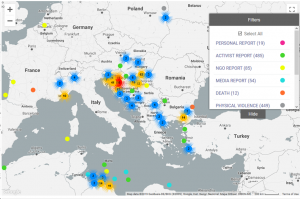

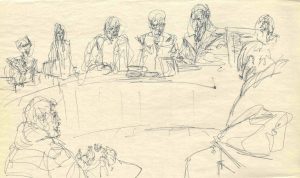
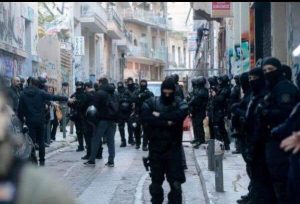
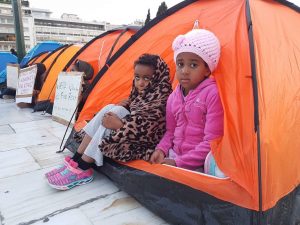
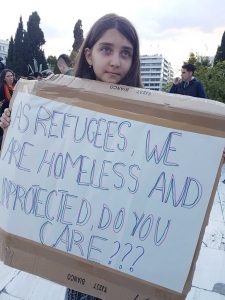
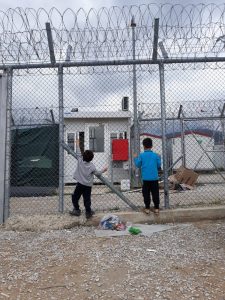
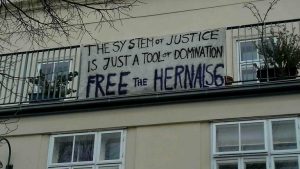 On 23. March 2019 the Hernals6 were found “guilty of barricading doors in the deportation prison, writing a goodbye letter and each of them setting a towel in fire and putting it on their beds with the intention to stop near their deportation, as the judge said.” Five of them got sentences with up to 3 months and were released directly after as they had been in prison already during the trial, one got a sentence for 12 months and will stay in prison.
On 23. March 2019 the Hernals6 were found “guilty of barricading doors in the deportation prison, writing a goodbye letter and each of them setting a towel in fire and putting it on their beds with the intention to stop near their deportation, as the judge said.” Five of them got sentences with up to 3 months and were released directly after as they had been in prison already during the trial, one got a sentence for 12 months and will stay in prison.